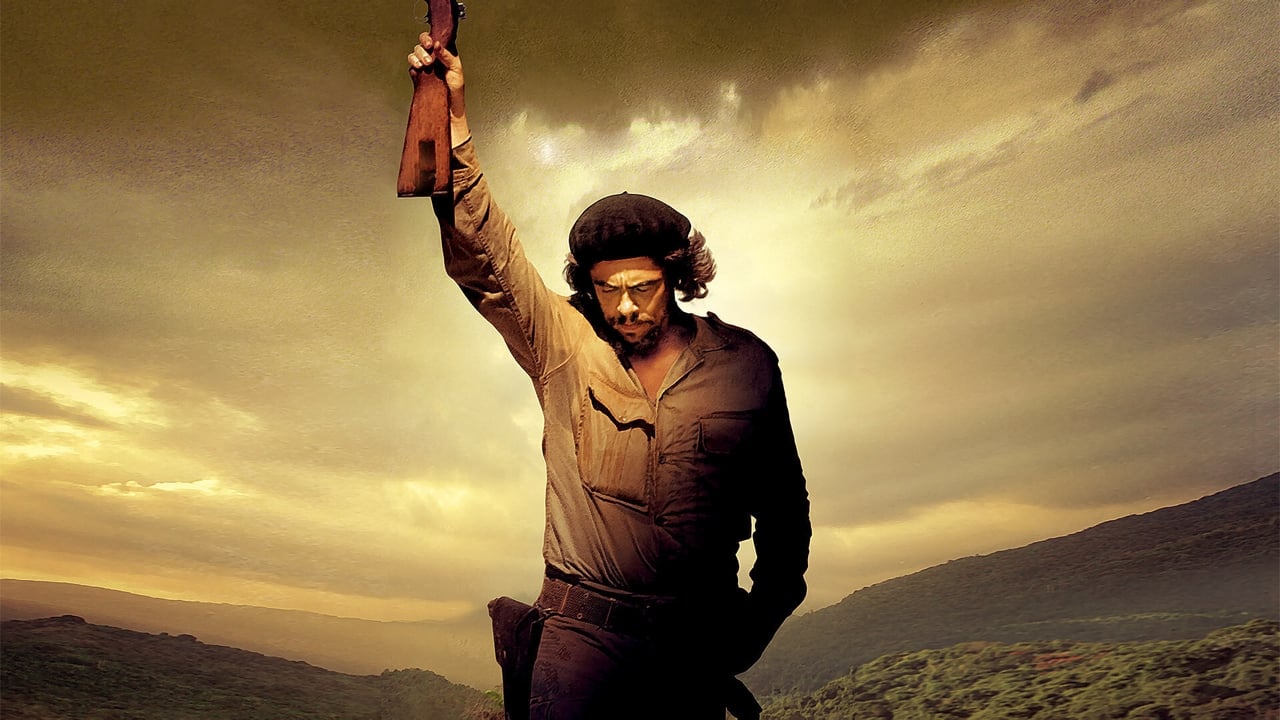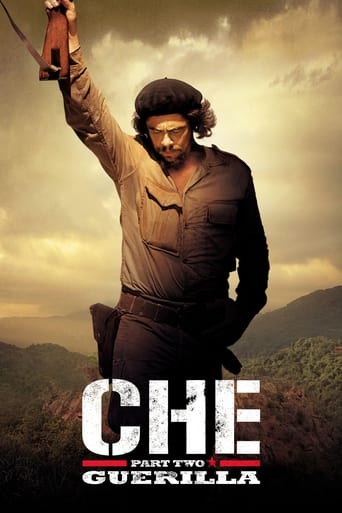



A different way of telling a story
Watch something else. There are very few redeeming qualities to this film.
View MoreExcellent and certainly provocative... If nothing else, the film is a real conversation starter.
View MoreThe film never slows down or bores, plunging from one harrowing sequence to the next.
View MoreOverlong and a little boring followup about Che's existence in the Bolivian jungles in which Ernesto Guevara leads a small partisan army to fight an ill-fated revolutionary guerrilla war in Bolivia, South America . While the first installment was set in 1956, when Ernesto 'Che' Guevara and a band of Castro-led Cuban exiles mobilize an army to topple the regime of dictator Fulgencio Batista , this second part was set in 1967 , Bolivia . Here Che has to confront sad happenings about his few supplies and troops , his failing health, and a local population who widely does not share his idealistic aspirations . As the US supported Bolivian army prepares to defeat him , Che and his surrounded guerrilla fight the increasingly hopeless risks . This biographic picture contains thrills , interesting political deeds , shootouts , wartime scenes and historical events . Che, El Argentino (2008) and this film were screened combined at the Cannes Film festival 2008 under the title "Che" . Terrific acting by the main starring , Benicio Del Toro as the mythical historic figure . For his role, he spent seven years researching Guevara's life . Although Benicio Del Toro was always considered the absolute first choice to headline this film , Val Kilmer was considered as a secondary option to play Argentine revolutionary Che Guevara if Del Toro had not been available. Suppport cart is frankly excellent , plenty of Spanish actors who give splendid interpretations such as Jordi Molla , Ruben Ochandiano , Yul Vazquez , Oscar Jaenada , Carlos Bardem , Elvira Minguez , Eduard Fernández , Pedro Casablanc , Luis Callejo , Antonio de la Torre , among others . And brief appearance from Matt Damon and Lou Diamond Phillips . Very good photography by the same Steven Soderbergh , as usual , being the first feature-length movie to be shot with the Red One Camera . Evocative as well as atmospheric musical score by the Oscarized Alberto Iglesias . The motion picture was professionally directed by Steven Soderbergh , though Terrence Malick originally worked on a screenplay limited to Guevara's attempts to start a revolution in Bolivia ; when financing fell through, Malick left the project, and subsequently Steven agreed to direct the film .The movie is well based on historical facts , these are the followings : On November 3, 1966, Guevara secretly arrived in La Paz on a flight from Montevideo under the false name Adolfo Mena González, posing as a middle-aged Uruguayan businessman working for the Organization of American States . Three days after his arrival in Bolivia, Guevara left La Paz for the rural south east region of the country to form his guerrilla army. Guevara's first base camp was located in the mountain dry forest in the remote Ñancahuazú region . Training at the camp in the Ñancahuazú valley proved to be hazardous, and little was accomplished in way of building a guerrilla army . The Argentine-born East German operative Haydée Tamara Bunke Bider, better known by her nom de guerre "Tania", had been installed as Che's primary agent in La Paz . Guevara's guerrilla force, numbering about 50 men and operating as the ELN ( "National Liberation Army of Bolivia"), was well equipped and scored a number of early successes against Bolivian army regulars in the difficult terrain of the mountainous Camiri region during the early months of 1967. As a result of Guevara's units' winning several skirmishes against Bolivian troops in the spring and summer of 1967, the Bolivian government began to overestimate the true size of the guerrilla force. But in August 1967, the Bolivian Army managed to eliminate two guerrilla groups in a violent battle, reportedly killing one of the leaders. As Guevara's plan for fomenting a revolution in Bolivia failed for an array of reasons . Then Che's guerrilla running out of provisions and medicines . On October 7, 1967, an informant apprised the Bolivian Special Forces of the location of Guevara's guerrilla encampment in the Yuro ravine . With apparent American help, the army is soon onto Che, so now we see Che hunted down, the local people are unhelpful and there's a desperate hunt for food . So he has to go wandering in yet more jungle and in familiar territory, more often having to hide from search aircraft , and while being slowly encircled until his caught, after being shot in the thigh . On the morning of October 8, they encircled the area with two battalions numbering 1,800 soldiers and advanced into the ravine triggering a battle where Guevara was wounded and taken prisoner while leading a detachment . Guevara was tied up and taken to a dilapidated mud schoolhouse and then Bolivian President René Barrientos ordered that Guevara be killed. The executioner who volunteered to kill Guevara was Mario Terán, a sergeant who had personally requested to shoot him because three of his friends from B Company, had been killed in an earlier firefight with Guevara's band of guerrillas. To make the bullet wounds appear consistent with the story that the Bolivian government planned to release to the public, Félix Rodríguez ordered Terán not to shoot Guevara in the head, but to aim carefully to make it appear that Guevara had been killed in action during a clash with the Bolivian army .
View MorePart Two is titled Guerrilla. In 1965, Che disappears from Cuba and declares in a letter read by Castro that he intends to go abroad to spread the revolution. In 1966, he arrives in Bolivia in disguise. He joins a local group of revolutionaries. However he finds it difficult to recruit from the distrustful locals. He struggles to gain their trust. His group suffers desertions and loses. They are outnumbered and hounded by the Army and its CIA advisers.This part uses a straight forward timeline. The problem is that the story is a long slow downhill trek. The movie incorporates that feeling and it's a grind. The story meanders aimlessly like the guerrillas. It's also repetitive as the days seem to be the same over and over again. Che has nothing but problems as they grind him down. In the process, they grind down the audience.
View MoreWhile "Che:part one", the first installment of the docu-biopic about Guevara, shows us "Che" in a victorious - albeit dull - mood, here we have only an excruciatingly dull description of his failure and death. As in the first part, these tragic events are described without the slight tension or dramatic resonance.Again, we are given no insight whatsoever about the man and his motivations. If anything, Guevara's behaviour can only raise doubts about his soundness of mind. He had a family and a good life and yet decided to leave everything behind, for the sake of misguided ideas about permanent revolution.Just like in the first part, we are shown a documentary-like version of the long and unexciting ride during the ill-fated Bolivian guerrilla. However, we are not shown the six months Guevara spent in Congo, which would have explained why the Bolivian authorities insisted in stating to the press that Guevara was still there.Neither are we shown the disastrous results of the Congolese mission, which would have explained why Guevara seems so disconsolate and acting like a doomed man running towards the inevitable defeat.The whole mood of the film is doomed and gloomy. The pace is lethargic. It is hard to believe any of the guerrilla fighters believed they could actually win, considering the odds against them, even more so Guevara, given his considerable experience of the world.What we see here is a disappointed man engaged in what he knew was a suicide mission. The reasons for which remain unexplained.
View MorePersonally, I am fascinated by the personality of Che Guevara that led him to the belief that ideals are achievable. If he didn't fully succeed I think it was because at some point he lost his realism on life. Life on Earth is not really the place where one can reach high ideals. Not because the ideals are not part of the human life, but because forgetfulness is a stronger part of it. Forgetfulness seeps in every act of our lives and thus we come to forget ideals and ideas and bother for instinctual calls, which are hardly ever forgotten because they scream out too loud. Anyway, I should discuss the film about Che, not Che himself. I don't think the film managed to represent a powerful, ambitious, motivating and idealistic Che. I would say that Che from the movie was rather bored and, if he had any purpose in all that he had done, that was nothing but fame. Besides this moral aspect, it is also the physical one. Real Che was incredibly handsome and the chosen actor is not half resembling Che. I'd make a suggestion...Have any of you ever looked comparatively at Colin Farrell and Che? It happened to me at some point...They are very similar in appearance! If any director ever understands the greatness of a GOOD CHE MOVIE, then I am sure Colin Farrell will be his choice. Maybe, maybe...
View More